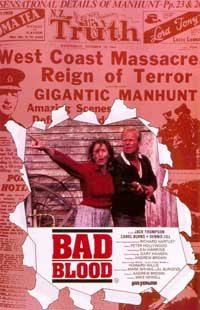
BAD BLOOD
New Zealand, 1981, 104 minutes, Colour.
Jack Thompson, Carol Burns, Martyn Sanderson, Marshall Napier.
Directed by Mike Newell.
Bad Blood is a striking British/ New Zealand co-production. It is based on the true story of a crime in wartime New Zealand, 1941, the west coast of the South Island.
The film highlights a closed community, some of the paranoia of the war effort, suspicions of the outsider, the effect on the outsider - especially smouldering violence which eventually erupts.
Jack Thompson is excellent as the outsider who wants to hold on to his gun and breaks out murderously when officials come to take it away. He is urged on by his eccentric and demanding wife, played very well by Carol Burns. The film shows a glimpse of the community, the pursuit of the killer, the posse mentality. The film was also beautifully photographed and shows New Zealand to excellent advantage.
The film was directed by British director Mike Newell, whose credits include The Awakening, the story of Ruth Ellis, the last woman to be executed in Great Britain, Dance with a Stranger, the Hong Kong- British Sour Sweet, Four Weddings and a Funeral and Donnie Brasco.
1.Impact of the film? True story?
2.1941, re-creation of the period, mentality, isolation on the South Island? Violence and prejudice?
3.The New Zealand beauty, the mountains, the town and its lifestyle? Authentic? Musical score?
4.The British director and his perspective, the Australian leads? The New Zealand cast?
5.Portrait of a community, New Zealand, the small town, the farms? Isolation, people knowing each other, attitudes towards the outsiders? Day-by-day life? The war effort, the men at drill, the women and helping with supplies?
6.The background of World War Two, the news coming in, radio? Defence? Ironic in remote New Zealand? Discussion of spies, guns? The rounding up of the guns? Stan and Dot caught up in the war atmosphere, their night rifle practice and their glee, the importance of the guns? Their attitudes towards Hitler, espionage? Suspicions of the townspeople?
7.Stan and Dot at home, lifestyle, interactions, personalities? Love, tension? Day by day, angers, hurt? Their son?
8.Jack Thompson as Stan: tough, isolated, bad temper, hard at work, relating with Dot, with the other people? Paranoid style? The importance of the gun, making an issue of it? The night practice? Eccentricity, reaction to the requests for the gun, suspicions, the orders, his reaction, the officials and the police coming, breaking out?
9.The tension about the gun, the set-up, Stan's anger, the bargaining, the orders, tough talk, taking the gun? The moment and the heat of the reaction? The shootings? Dot egging Stan on? Shooting? The deaths, the policeman lingering, Dot making him write the confession? The others coming, the official and his confidence, his being shot? The killings in cold blood?
10.The effect on Stan and Dot? Bewilderment, racing out, hiding, the guns, his savagery? Staying in the town, returning to the house, stalking the guards? Shooting? Stan himself being pursued, out in the bush, wounded? Hurt, desperate wandering through the mountains? Surviving? Confronted, caught and shot? In the hospital, his dying, Dot's visit? The pathos of his death?
11.Dot, tension and sullenness, her manner, backing her husband up, righteousness? The shooting? Her reaction, her son? Wanting to be in the house and demanding her rights? Taken care of by others? The son, surviving? The solemn visit to the hospital, her bewilderment, Stan and his injuries, his death? Her contribution to what happened? The boy, his watching, school? His telling the police that his dad shot the cops?
12.The portrait of the police in the town, doing their job, personalities, attitudes? Attitudes towards Stan? The visit? Confrontation, violent deaths? The man lingering and writing his confession? The people's reactions, the posse, the posse mentality, the siege of the house, the men shot? The officials coming in, organising the parties? Out in the bush, the young men finding Stan, shooting him?
13.The women of the town, their war effort work, attitudes towards Dot? Making her the outsider?
14.The impact of the episode on society, in New Zealand? Seen in retrospect? And the significance of the title - spilt blood, murder, Stan and his mental attitudes?